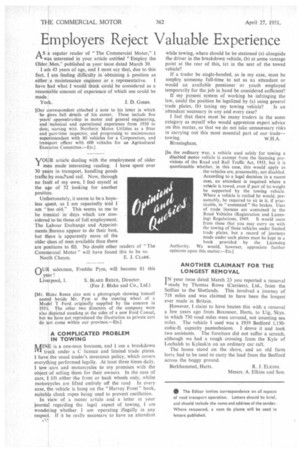Employers Reject Valuable Experience A S a regular reader of "The
Page 34

If you've noticed an error in this article please click here to report it so we can fix it.
Commercial Motor," I was interested in your article entitled "Employ the Older Men." published m your issue dated March 30.
1 am 43 years of age, and I must say that, due to this fact. I am finding difficulty in obtaining a position as
either a maintenance engineer or a representative. 1 have had what I would think could be considered as a reasonable amount of experience of which use could be made York. J. D. Glans.
(Our correspondent attached a note to his letter in which he gives full details of his career. These include five • years' apprenticeship in motor and general engineering, and technical and operational experience from 1930 to date, starting with Northern Motor Utilities as a fitter and part-time inspector, and progressing to maintenance superintendent with 80 vehicles for a Corporation, and transport officer with 600 vehicles for an Agricultural Executive Committee.—Fo.)
TOUR article dealing with the employment of older men made interesting reading. I have spent over 30 years in transport, handling goods traffic by roa(Pand rail. Now, through no fault of my own, I find myself at the age of 52 looking for another position.
Unfortunately, it seems to be a hopeless quest, as 1 am repeatedly told I am "too old." This seems to me to be ironical in days which are considered to be those of full employment. The Labour Exchange and Appointments Bureau appear to do their best, but there is apparently more of the older class of men available than there are positions to fill. No doubt other readers of "The Commercial Motor" will have found this to be so.
North Cheam. E. J. CLARK.
(Mr. Blake Reece also sent a photograph showing himself seated beside Mr. Pym at the steering wheel of a Model T Ford originally supplied by the concern in 1911. The other two directors of the company were also depicted standing at the sides of a new Ford Consul, but we have not reproduced the illustration as private cars do not come within our province.—ED.] A COMPLICATED PROBLEM IN TOWING 'MINE is a one-man business, and I use a breakdown 11'4 truck under a C licence and limited trade plates. I have the usual trader's insurance policy, which covers everything performed legally. At least three times daily, I tow cars and motorcycles to my premises with the object of selling them for their owners. In the case of cars, I lift either the front or back wheels only, whilst motorcycles are lifted entirely off the road In every case, the vehicle is hung on the "Harvey Frost" hook, suitable check ropes being used to prevent oscillation.
In view of a recent article and a letter in your journal regarding the legal aspect of towing, 1 am wondering whether I am operating illegally in any respect. Tf it be really necessary to have an attendant while towing, where should he be stationed (a) alongside the driver in the breakdown vehicle, (b) at some vantage point at the rear of this, (c) in the seat of the towed vehicle?
If a trader be single-handed, as in my case, must he employ someone full-time to act as an attendant or would an available pensioner or youth employed temporarily for the job in hand be considered sufficient?
If my pment system of working be infringing the law, could the position be legalized by (a) using general trade plates, (b) taxing my towing vehicle? Is an attendant necessary in any and every case?
I feel that .there must be many traders in the same category as myself who would appreciate expert advice on this matter, so that we do not take unnecessary risks in carrying out this most essential part of our trade—
towing. W.H.A. Birmingham.
[In the ordinary way, a vehicle used solely for towing a
disabled motor vehicle is exempt from the licensing pro visions of the Road and Rail Traffic Act, 1933, but it is questionable whether, in this case, this would apply as the vehicles are, presumably, not disabled. According to a legal decision in a recent case, an attendant is required where a vehicle is towed, even if part of its weight be supported by the towing vehicle. Where a vehicle is trailed he would, presumably, be required to sit in it, if practicable, to "command" the brakes. Uses of trade licences are contained in the Road Vehicles (Registration and Licens ing) Regulations, 1949. It would seem from these that you may carry on with the towing of these vehicles under limited trade plates, but a record of journeys made under such plates must be kept in a book provided by the Licensing Authority. We would, however, appreciate further opinions upon this matter.—Fol
ANOTHER CLAIMANT FOR THE LONGEST REMOVAL
'your issue dated March 23 you reported a removal made by Thomas Rowe (Carriers), Ltd., from the Scillies to the Shetlands. This involved a journey of 718 miles and was claimed to have been the longest ever made in Britain.
However, 1 claim to have beaten this with a removal few years ago from Box moor, Hens, to Uig, Skye, in which 730 road miles were covered, not counting sea miles. The vehicle I used was a 1939 Bedford 1,150cubic-ft. capacity pantechnicon. 1 drove it and took two assistants. The furniture did not suffer a scratch, although we had a rough crossing from the Kyle of Lochalsh to Kyleakin on an ordinary car raft.
The house stood on the shore, and an old farm lorry had to be used to carry the load from the Bedford across the boggy ground.
Berkhamsted, Herts. R. J. ELKINS.
Messrs. A. Elkins and Son.












































































